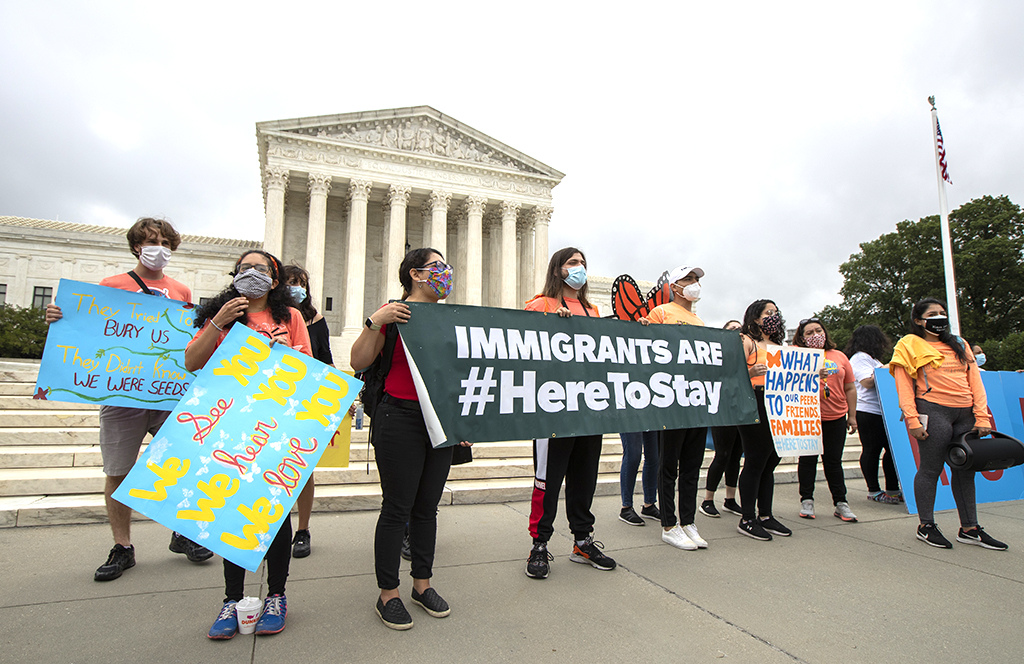By Ruth Bayang
NORTHWEST ASIAN WEEKLY

In this June 18, 2020, photo, Deferred Action for Childhood Arrivals (DACA) students celebrate in front of the Supreme Court after it rejected President Donald Trump’s effort to end legal protections for young immigrants. (AP Photo/Manuel Balce Ceneta)
Asian Americans and Pacific Islanders (AAPI) leaders are urging citizens to demand that lawmakers support a pathway to citizenship for Deferred Action for Childhood Arrivals (DACA) recipients.
The U.S. Supreme Court ruled 5-4 last week that the Trump administration was not legally authorized to terminate the DACA amnesty program in 2017.
Michael Byun, the executive director at Asian Counseling and Referral Service, said 30,000 of DACA recipients are AAPIs.
“For these young people, it’s an incredibly emotional victory as they have bought time to continue going to school and working in the U.S, and perhaps most importantly, living in the communities they consider home.”
President Donald Trump has said that he will renew his effort to end DACA, even though experts say there isn’t enough time to knock down the program before the November election.
Byun said DACA recipients are vulnerable until Congress takes action to protect them.
“It is up to the community, where the majority are strongly in favor of legal pathways to citizenship for these individuals, to weigh in. We must continue to fiercely advocate not only for programs like DACA, but for the rights, safety, and dignity of all undocumented immigrants.”
“For all of us who believe in the humane and moral treatment of immigrants, a vision that has been crushed by a cruel, xenophobic Trump administration again and again,” said Rep. Pramila Jayapal. “For the ideal of an America inscribed in the Statue of Liberty, the beacon of hope for many around the world. Dreamers have been at the center of that: the face of inspiration, the demonstration of courage in the darkest of times, the beautiful people who put one foot after the other and push forward the change that is needed.”
CISC Executive Director Michael Itti said, “We must continue to support the Dreamers, who arrived in the U.S. from all over the world when they were children. Our core values as Americans demand that we support creating a pathway to citizenship for DACA recipients, fix our immigration system, and undo anti-immigrant policies.”
Many believe Trump could modify the rescinding of DACA in the same way he changed a travel ban on mostly Muslim countries. The ban was upheld by the Supreme Court after two revisions in over a year, including adding North Koreans and some Venezuelan officials to the ban.
“The continued existence of DACA ensures that many in our community can continue to build families, pursue education, and work without fear and threat of deportation,” said the Japanese American Citizens League in a statement. It also said it agrees with the Court’s opinion that the Department of Homeland Security’s decision to end DACA was “arbitrary and capricious.”
Megan Essaheb, director of immigration advocacy for the Washington-based nonprofit Asian Americans Advancing Justice, said that while Trump can still terminate DACA, he could also choose to support legislation that provides legal status to recipients, along with 300,000 people who have temporary status and the estimated 11 million who are in the United States without permission.
“If he chooses cruelty, it will be on him,” Essaheb said.
Byun said the Supreme Court’s decision is an important reminder that organizing works and he urged people to “make a commitment to be a part of this fight—to join the conversation around immigration justice, to advocate for the rights and protection of our undocumented immigrants, to show up on the streets for Black immigrants facing police violence, and to vote come Election Day.”
Ruth can be reached at editor@nwasianweekly.com.



